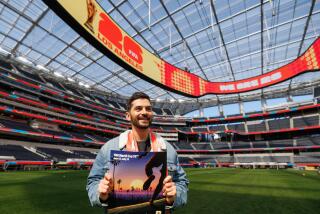Cup Followers Pour It On in L.A.
- Share via
The color of the day is red: heart red, blood red, team red. It’s the dominant color of the flag of Trinidad and Tobago, World Cup debutants in Germany; the color of emotion and home. It spills, just before 9 a.m. on a recent day, onto a sidewalk and to an adjoining parking lot, like an infusion of life and music into an otherwise nondescript Inglewood neighborhood.
These are the fans of the Soca Warriors of Trinidad and Tobago, celebrating their team’s first appearance in the World Cup in Germany. A hundred or more are crammed into the Caribbean Treehouse, a homely, compact restaurant that for this day serves as social club, sports bar and a link to home, as will dozens upon dozens of such places across the vast metropolis of Los Angeles.
At the Phoenix club of German-Americans in Anaheim, at the British and Dominion Social Club in Garden Grove, at Zambumba -- like the Brazilian soccer deities it worships, a venue that needs only a single name -- on the edge of Culver City, the World Cup has added a different and discernible pulse to the daily rhythms of life in Southern California.
The tournament was headquartered here in its first visit to the United States in 1994. Today, almost 40% of Los Angeles’ population is foreign-born, with 140 different countries represented on the family trees of that populace. With 32 teams in the World Cup field, there is a fan base for every nation.
Professor William Clark, who teaches courses on migration and metropolitan change at UCLA, applies a simple benchmark to determine when a sport or a team has earned widespread affection.
“It’s not like when the Lakers were playing, and everyone had Laker flags on their cars,” Clark said. “You’re talking about a big city with a million competing agendas. If there was a buzz, I would be hearing it.”
But the support of the Lakers, or the Clippers, Dodgers or Angels, while substantial, tends to be massively dispersed.
The real local story of the World Cup is that each game becomes the focus of a gathering of expatriates, and that those ties to the land of birth or family remain as or more firm than ever.
It was something more than a game of soccer that drew Keith Lee from his bed at 3.45 a.m. for the drive from Temecula to an outdoor screening in Koreatown of South Korea’s first World Cup match last week. Lee, 45, a U.S. resident for 22 years, stood at the back of 3,000 people, sitting on closed-off Normandie Avenue.
“This is kind of a symbolic moment,” he said. “We’ve come a long distance in a short period. The young generation right now don’t remember much about the poor era, economically.”
There was no mistaking the “we” he was referring to. The crowd was clad in vivid red T-shirts, each fitted with South Korean and U.S. flags, screaming in unison with the drums and amplified chants of a young man on stage. The live broadcast of the game was a marvel of satellite pinball -- from Frankfurt, Germany, to Seoul, to Los Angeles.
Five days later, there were 20,000 at Staples Center for South Korea’s tie with France.
Those moments are being repeated everywhere as Los Angeles, city of emigres, pauses to watch the games, and to re-connect. They may aspire to live in America, be American, contribute to its society, hope to enjoy its benefits, but there is still a part of them that belongs to home.
How else to explain the swelling of the throat, the reddening of the eyes, at the sound of the national anthem, and the distorted crowd chorus that attends it. And you haven’t seen the world until you’ve seen how it celebrates, mourns and recriminates, each country, each team, in its own distinctive fashion.
“Oi Oi Oi” in Australian is “Oh lay, ole ole ole” in Latin, is “In-guh-lund” in the mother tongue.
In Los Angeles, this is what life can briefly be like: the world, writ local:
* On Venice Boulevard, just east of the 405, the Brazilians, clad in their team’s lemon yellow jerseys, setting up a makeshift home theater on a rooftop.
* On Eighth Street in Koreatown, mid-morning, a young man clad in a red T-shirt smiles broadly while stopped at a traffic light, Korean music blaring through the open windows of his car.
Where else could you possibly want to be? Apart from Germany, of course.
More to Read
Go beyond the scoreboard
Get the latest on L.A.'s teams in the daily Sports Report newsletter.
You may occasionally receive promotional content from the Los Angeles Times.






